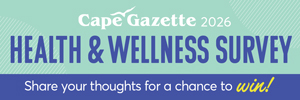Now that the COVID-19 vaccine is starting to be distributed, Beebe Healthcare officials say scams and fraud related to the vaccine have been reported.
On Dec. 3, the U.S. Department of Health and Human Services issued a fraud alert about reported scams surrounding the need to purchase a vaccine. The same day, a health system in Rhode Island reported community members received direct phone calls, emails, or texts from a supposed physician telling them to pay money to secure their spot in line for the vaccine. Upon investigation, officials said, the name being used in these scams was not even a practicing physician in the state.
Consumers should beware of any call, email, or text asking them to pay money to secure a place in line to receive a COVID-19 vaccine, said Rob Bentley, Beebe Healthcare’s IT security manager.
“Scammers try to outsmart consumers by appealing to what consumers want or need as they attempt to trigger an emotional and/or psychological response with sense of urgency. The COVID-19 vaccine is no different,” Bentley said. “Scammers know that consumers want the pandemic to be over, and they are trying to capitalize on our fear and our interest in moving past the pandemic. They are doing this in a number of ways. Consumers should know – you should never need to pay anything in order to get a COVID-19 vaccine.”
Bentley said scammers will use whatever means necessary, so it isn’t too far-fetched to think that moving forward, they may use real physician names or even names of organizations to push their agenda.
Some tips to consider include:
- Be extremely critical when you get a call, email, or text
- Ask yourself, does this make sense?
- Before giving out any money or information, do some online research
- If someone reaches out to you by phone, email, and/or text, don’t hesitate to directly contact their organization or healthcare office immediately for validation.
In addition to avoiding scams related to getting the vaccine, consumers should also be wary about alleged news reports, especially on social media platforms. There are fraudulent posts out there on many social media channels questioning the validity or efficacy of the vaccine itself. It is important that consumers look to verified and valid sources when it comes to understanding how the vaccine works and how effective it is.
While there is much still being researched, organizations such as the Centers for Disease Control and Prevention, the Delaware Division of Public Health, and the World Health Organization are verified sources where people can gather valid information related to the vaccine.
“With the digital landscape now connected more than ever with school, remote workforce, third-party supply chains, and digital social connections while socially distancing, it is now more important than ever to remain vigilant with caution,” Bentley said. “We shouldn’t view cyber hygiene and health as an inconvenient burden, but begin embracing it as an imperative and long-overdue new norm and lifestyle.”





















































